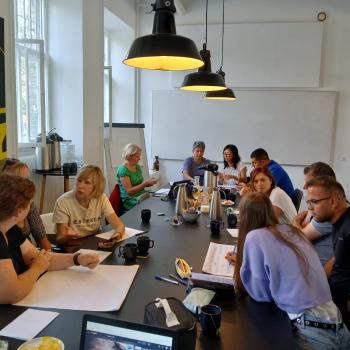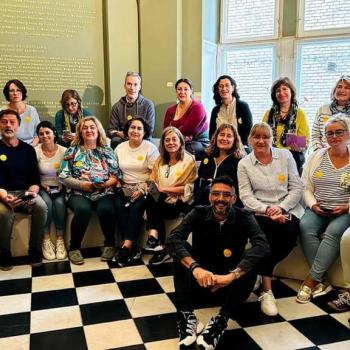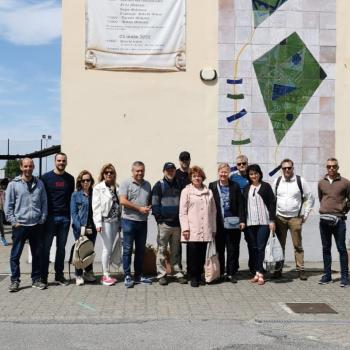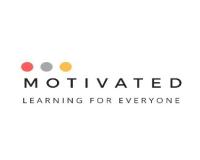
“MENTORING SKILLS FOR CAREER DEVELOPMENT”
The purpose of this KA1 Erasmus+ Course is: To introduce participants to mentoring process and share best practices for establishing and managing a successful mentoring programme; To explore the ways to establish a constructive mentor-mentee relationship; To understand the key points on understanding and explaining the benefits of mentoring.
Description
Programme of training activities day-by-day:
MONDAY (Day 1)
Module 1: Welcome and registration; Ice-breaking and Warmups. Team-building session
Introduction to the Idea of Mentoring ; Key – factors in successful mentoring
TUESDAY (Day 2)
Module 2: Workshop: Mentors’ and mentees’ roles and responsibilities; Mentor versus Manager; Mentoring tools; Brainstorming session
WEDNESDAY (Day 3)
Module 3: Outdoor activity with a training task: “Treasure Hunt”
THURSDAY (Day 4)
Module 4: Workshop: Stages and forms of Mentoring; Key steps for Effective Mentoring Relationship; Mentor and Mentee Dos and Don’ts; Role – playing session
FRIDAY (Day 5)
Module 5: Workshop: Lateral thinking session; The GROW Model; Mentoring and Coaching – differences and parallels; Potential Problems in Mentor – Mentee Relationship; Conclusion of the day: How to be an effective mentor and a successful mentee
SATURDAY (Day 6)
Module 6: Group work: Benefits of Mentoring process for mentees, mentors and organizations
SUNDAY (Day 7)
Module 7: Feedback, course evaluation and dissemination focus; Delivery of certificates
IMPORTANT: PARTICIPANTS COULD ATTEND 5, 6, 7 OR MORE DAYS IN ACCORDANCE WITH THEIR APPLICATION. COURSE FEE INCLUDES TRAINING, COURSE DOCUMENTS (TEMPLATES WILL BE SENT TO PARTICIPATING TEACHERS), COFFEE BREAKS, STATIONARY, SIGHTSEEING, SCHOOL VISIT AT MOST LOCATIONS WHERE THE COURSE WILL BE HELD.
Learning objectives
To develop greater proficiency in:
Building leadership skills by developing ability to motivate and encourage others;
Improving communication skills;
Learning new perspectives and new way of thinking that will help the participants in their work life as well as their personal life;
Advancing the career by realizing that refining the leadership skills can strengthen your on-the-job performance;
Gaining personal satisfaction knowing that you’ve directly contributed to someone’s growth and development and seeing your mentee succeed as result of your input;
Modeling behavior, attitudes and skills in the workplace;
Career planning and goal setting;
Writing resumes and cover letters;
Conducting mock interviews and providing support for answering interview questions;
Exploring possible careers and assisting with job, internship, or program searches;
On-the-job skill development (soft skills or technical skills);
Respecting different cultures and backgrounds of the mentee;
Ability to listen and to offer friendship, guidance, and encouragement;
Other objectives are: Describe mentoring and coaching correctly; Plan and consider the best practices for creating a mentoring program; Determined the benefits of mentoring for all parties involved; Define the advantages of a mentoring program; Figure out how the role of a mentor differs from that of a coach or counsellor; Point out the use of appropriate language in mentoring; Using different approaches when mentoring; Explain the mentor’s and mentee’s responsibilities; Propose troubleshooting strategies to address eventual problems; Equip participants with necessary skills to function as mentors to others in the organisation; Apprehend the importance of confidentiality in a mentoring relationship.
Methodology & assessment
Certification details
At the end of the course, each participant will be awarded a Certificate of Attendance along with Europass Mobility.
Our certificates are in line with the Erasmus Quality Standards and so include the course's title, short description of its learning outcomes (if requested), dates, venue, the name of the course provider and the course director, number of training hours.
We support participants in every step of certification and validation of learning outcomes focusing specifically on European instruments and Erasmus+ requirements such as Learning Agreement, Quality Commitment and Europass mobility.
Pricing, packages and other information
-
Price:560Euro
Additional information
-
Language:English
-
Target audience ISCED:Lower secondary education (ISCED 2)Upper secondary education (ISCED 3)Other
-
Target audience type:TeacherCareers CouncillorHead Teacher / Principal
-
Learning time:25 hours or more
Upcoming sessions
Past sessions
More courses by this organiser

EMERGING MODELS IN EDUCATION: FLEXIBILITY, INNOVATION, COLLABORATION

“Artificial Intelligence in Classroom: Teacher's Guide”


